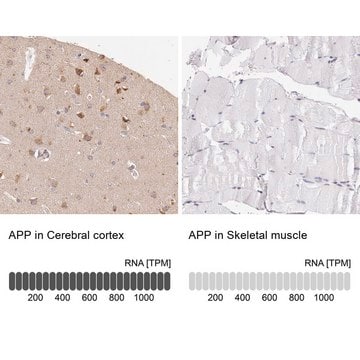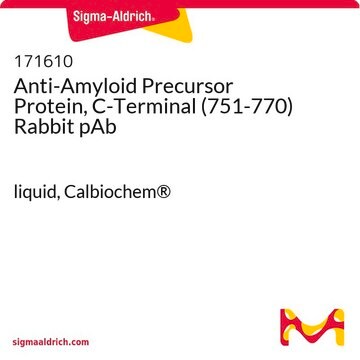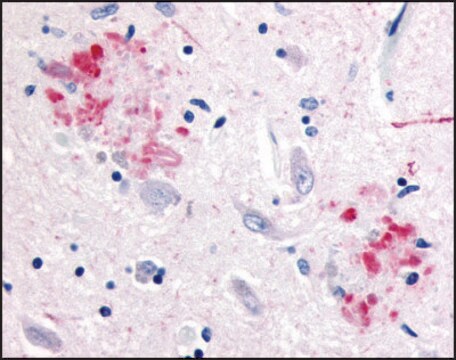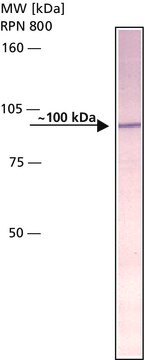MAB343
Anti-APP Antibody, APP 643-695 CT fragment, clone 2.F2.19B4
ascites fluid, clone 2.F2.19B4, Chemicon®
Sinónimos:
APP, Jonas clone
Iniciar sesiónpara Ver la Fijación de precios por contrato y de la organización
About This Item
UNSPSC Code:
12352203
eCl@ss:
32160702
NACRES:
NA.41
Productos recomendados
biological source
mouse
Quality Level
antibody form
ascites fluid
clone
2.F2.19B4, monoclonal
species reactivity
rat, human
manufacturer/tradename
Chemicon®
technique(s)
immunohistochemistry: suitable (paraffin)
western blot: suitable
isotype
IgG1
NCBI accession no.
UniProt accession no.
shipped in
dry ice
target post-translational modification
unmodified
Gene Information
human ... APP(351)
Specificity
Reacts with intact full-length Alzheimer precursor protein (APP) and selectively with the cytoplasmic carboxyl fragment of APP 643-695. Epitope has reportedly been mapped in this paper http://www.impub.co.uk/abs/W386.html
Immunogen
Carboxyl fragment of APP 643-695 / Jonas.
Epitope: APP 643-695 C-terminal fragment
Application
Immunohistochemistry on paraffin sections: 10-20 μg/mL * See protocol below.
Western blot: 10 μg/mL
Optimal working dilutions must be determined by end user.
APPLICATION NOTES FOR MAB343
IMMUNOHISTOCHEMISTRY
1) Prepare paraformaldehyde-fixed paraffin sections. Wash twice for 5 min in xylene to deparaffinize. Wash sections for 5 min in a descending series of alcohol solutions (100%, 96%, 90%, 80%, 70%, 50%, 30%).
2) Wash sections 3 times in distilled water.
3) Wash in TBS (50 mM Tris-HCl, 150 mM NaCl, pH 7.6). To block endogenous peroxidase wash with methanol containing 0.6% H2O2 (v/v) and 10 % horse serum (v/v) for 5 min at room temperature.
4) Wash sections for 5 min in TBS.
5) Incubate sections with MAB343 (diluted in TBS containing 10% horse serum (v/v)) overnight at +4°C or for 2 hours at 37°C in a humid chamber.
6) Wash sections 3 times in TBS for 5 min..
7) Detect with standard secondary antibody detection system (PAP, ABC, etc.).
8) Wash sections in TBS.
9) Embed sections and examine.
Western blot: 10 μg/mL
Optimal working dilutions must be determined by end user.
APPLICATION NOTES FOR MAB343
IMMUNOHISTOCHEMISTRY
1) Prepare paraformaldehyde-fixed paraffin sections. Wash twice for 5 min in xylene to deparaffinize. Wash sections for 5 min in a descending series of alcohol solutions (100%, 96%, 90%, 80%, 70%, 50%, 30%).
2) Wash sections 3 times in distilled water.
3) Wash in TBS (50 mM Tris-HCl, 150 mM NaCl, pH 7.6). To block endogenous peroxidase wash with methanol containing 0.6% H2O2 (v/v) and 10 % horse serum (v/v) for 5 min at room temperature.
4) Wash sections for 5 min in TBS.
5) Incubate sections with MAB343 (diluted in TBS containing 10% horse serum (v/v)) overnight at +4°C or for 2 hours at 37°C in a humid chamber.
6) Wash sections 3 times in TBS for 5 min..
7) Detect with standard secondary antibody detection system (PAP, ABC, etc.).
8) Wash sections in TBS.
9) Embed sections and examine.
Research Category
Neuroscience
Neuroscience
Research Sub Category
Neurodegenerative Diseases
Neurodegenerative Diseases
This Anti-APP Antibody, APP 643-695 C-terminal fragment, clone 2.F2.19B4 is validated for use in IH(P), WB for the detection of Alzheimer Precursor Protein.
Physical form
Liquid.
Unpurified
Storage and Stability
Maintain lyophilized material at +2–8°C for up to 12 months. After reconstitution maintain frozen at -20°C in undiluted aliquots for up to 6 months. Avoid repeated freeze/thaw cycles.
Analysis Note
Control
Brain
Brain
Other Notes
Concentration: Please refer to the Certificate of Analysis for the lot-specific concentration.
Legal Information
CHEMICON is a registered trademark of Merck KGaA, Darmstadt, Germany
Disclaimer
Unless otherwise stated in our catalog or other company documentation accompanying the product(s), our products are intended for research use only and are not to be used for any other purpose, which includes but is not limited to, unauthorized commercial uses, in vitro diagnostic uses, ex vivo or in vivo therapeutic uses or any type of consumption or application to humans or animals.
Optional
Referencia del producto
Descripción
Precios
Storage Class
10 - Combustible liquids
wgk_germany
WGK 1
flash_point_f
Not applicable
flash_point_c
Not applicable
Certificados de análisis (COA)
Busque Certificados de análisis (COA) introduciendo el número de lote del producto. Los números de lote se encuentran en la etiqueta del producto después de las palabras «Lot» o «Batch»
¿Ya tiene este producto?
Encuentre la documentación para los productos que ha comprado recientemente en la Biblioteca de documentos.
Amyloid beta protein precursor and the pathogenesis of Alzheimer's disease.
Selkoe, D J
Cell, 58, 611-612 (1989)
Arunabha Chakrabarti et al.
Genomics, proteomics & bioinformatics, 10(4), 208-216 (2012-10-23)
Amyloid precursor protein intracellular domain (AICD) is one of the potential candidates in deciphering the complexity of Alzheimer's disease. It plays important roles in determining cell fate and neurodegeneration through its interactions with several adaptors. The presence or absence of
Teresita L Briones et al.
Journal of neurotrauma, 26(4), 613-625 (2009-03-11)
In this study, we examined whether ischemia-induced amyloidogenesis could be modulated by environmental "experience," and whether this modulation is associated with improved cognitive functioning. Rats were subjected to either global ischemia or sham surgery and then were randomly assigned to
Processing of the amyloid protein precursor to potentially amyloidogenic derivatives.
Golde, T E, et al.
Science (New York, N.Y.), 255, 728-730 (1992)
Amyloid beta-peptide is produced by cultured cells during normal metabolism.
Haass, C, et al.
Nature, 359, 322-325 (1992)
Nuestro equipo de científicos tiene experiencia en todas las áreas de investigación: Ciencias de la vida, Ciencia de los materiales, Síntesis química, Cromatografía, Analítica y muchas otras.
Póngase en contacto con el Servicio técnico







